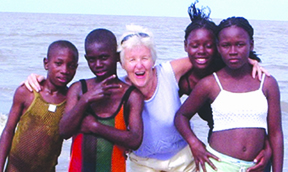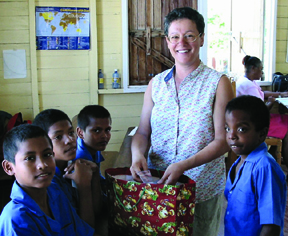Devika
A struggling family mourns the loss of a wife and mother
By Kate O’Donnell
Summer 2006
Return to Table of Contents
Print Article
Devika and her husband James started selling vegetables and fruit at the end of my street about a year ago. I would sit on the tree branch and listen to them, especially Devika, who would tell me her concerns for their children. At 15 months old, Anthony was the youngest of five, and there was another child on the way.
 (Credit Maggie Smith)
(Credit Maggie Smith)Easter Sunday at the beach with Devika and James’s children, L-R: Junior, Keion, Scarboro missioner Kate O’Donnell, Nackice and Holly.
Since our first meeting, I developed a soft spot for their son Keion who is nine years old and reminds me so much of my brother John at that age. Devika would often send Keion to my home with the special mangoes that I like.
James and Devika live among other squatters in Cow Dam, an area where many of the people are extremely poor. With money earned from selling vegetables, they were able to buy some timber to build a shelter for themselves and the children. They were really trying to make a home for the family.
Last October, Devika died in childbirth. She haemorrhaged giving birth to a wee girl. My heart broke when I heard the news. I had just bought fruit from her the previous morning. The family has named the baby Devika like her mother.
As soon as I heard the shocking news I went to Cow Dam to look for them. I had never been to their home and could not believe that this meagre structure was home for a family of seven. James met me and just cried in my arms and of course I cried with him.
A packed church
At the funeral I was sitting at the back of the packed church when the family and close friends came in. Somehow Keion got separated from the group and stood looking around. I was just about to go to him when he spotted me and a big smile brightened his face. He came over and hung onto me. More tears. After a few minutes I saw a relative looking for him so I told him to go with the family.
The president of the Education Association gave one of the tributes, praising Devika for being a loving and caring mother. She said Devika was one of the few women who would come to the school to inquire about how her children were doing. The president challenged the women at the funeral to be as involved in their children’s education as Devika was.
Also at the funeral were representatives from a women’s group in Cow Dam who are committed to helping women and children in their community. These women have made a commitment to see that Devika and James’s children have all they need to continue their education. Once again my eyes have been opened by the poorest of the poor who reach out to help one another in time of need.
Baby Devika is so tiny but very beautiful. Hopefully James will get back to his vegetable stand. He is also called “corn boy” as he cooks corn and rides around selling it. This family is really trying, “trying by the grace of God” as Devika used to say.
Difficult lives
Since the death of their mother, the children’s young lives have not been easy. The following Easter when my friend Maggie Smith visited from Canada, I decided we would take Devika and James’s oldest children—Keion, Junior, Holly and Nackice to the beach to fly kites on Easter Sunday.
Maggie thought this was a wonderful idea and thought that she would also invite some children that she knew when she worked here as a Scarboro missioner a few years ago. All the children involved in this venture were so excited as none of them had ever been to the beach before. Although the beach is only a 45-minute busride away, many families cannot afford the busfare for such an outing.
At 11:30 on Easter morning, I heard voices shouting at my gate, “Auntie Katie!” The children had arrived.
We began our Easter celebrations with a Scottish tradition as Maggie and I wanted to share our heritage. We painted hardboiled eggs and then rolled them until they broke open. Rolling the eggs represents the stone being rolled away from the tomb. Next we had an Easter hunt which is a North American tradition. The children loved participating in these new traditions and were full of questions about their meaning.
Flying homemade kites is a Guyanese Easter tradition representing Jesus risen from the dead. We made the kites when the boys were at my place the week before. I was amazed to see how they put the kites together with bristles from my broom (the broom is made from the veins of palm leaves) and ordinary paper. You should see how the kites soar. They bring so much joy to the children.
Then we set out on our journey. We drove to the bus station where we were to meet Maggie’s group of children. While we were waiting a minibus stopped and the driver asked us if we were going up the Corentyne. We told him we were, but we were meeting other people. No problem, he said, we’ll wait for your friends.
The children’s excited chatter filled the bus in anticipation of their journey and my heart swelled with joy listening to them. Arriving at the beach, Daniel our driver walked away and left the bus wide open. I stood open mouthed and thankful. Now we had somewhere to keep our things, to change in and to eat our lunch.
Words cannot express the joy I felt to see the children laugh and hear their screams as they jumped waves and splashed one another. For a short while they were able to be children without the hardship and worries that they endure in their daily lives. I had never seen them enjoy themselves so much.
Daniel returned to the bus at three o’clock as arranged, but the children were having such a wonderful time we asked him if we could have another half hour. He smiled and nodded his head.
On the trip back, the children were quieter, exhausted from their day of fun. I felt a deep peace and gratitude that once again God had touched the depths of my being through the innocence of these beautiful children. As I walk with them I know without a shadow of a doubt that I am “walking humbly with my God.”
 (Credit John MacInnis)
(Credit John MacInnis)Scarboro missioner Estrela De Sousa with a few of the boys she tutors and does crafts with at the St. John Bosco Boys’ Orphanage.
Small things do matter
By Estrela De Sousa
The work that I do here in Guyana matters to me and I believe to the people I accompany each day. I think that it is not just the big projects that have importance in mission, but also the small things we do on an individual level.
I enjoy working with the children at the Orphanage, bringing creativity to their minds and their little hands. When a child smiles, proud of the craft that they just finished making in our art class; or a look of thanks crosses the tired face of a street person when I stop to say hello or to give them a bit of food; or a neighbour happily returns my morning greeting. In these small acts, I may have helped to brighten their day a little. They have seen kindness, which may give them a boost to carry on in their difficult lives.
Yes, the small things matter and I am so grateful for the chance to be God’s hands and to do small things for God.
Return to Table of Contents
Print Article